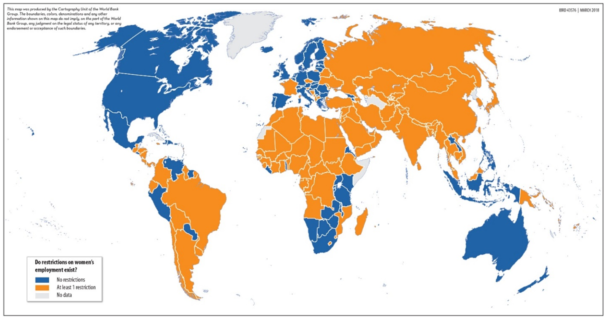
A few years ago, Gergana Ivanova became famous in my country, Bulgaria. She became the first woman to serve in the national guards’ unit and the first guardswoman to stand in front of the presidency – not only a great honor but also a dream she has had since she was in first grade. She was featured on the front page of the newspapers and her story sparked debates on talk shows on national TV.
Ivanova’s story, however, exemplified a complex reality: job opportunities are not equal for all and gender barriers are still normal in many countries around the world.
Most of the countries examined in the latest edition of the Women, Business and the Law report have legal restrictions on the type of jobs women can perform (map 1). This represents 104 out of the 189 economies surveyed. Sixty-five economies, for instance, restrict women from working in mining. Many economies also prohibit women from having the same access to employment as men in industries such as manufacturing (47 economies), construction (37 economies), energy (29 economies), agriculture (27 economies), water (26 economies) and transportation (21 economies). Laws that restrict women’s access to certain jobs and constrain their ability to work at night not only limit women’s employment opportunities but also contribute to an increase in the gender wage gap.
Map 1: 104 economies impose at least one legal restriction on women’s employment

This all changed in the summer of 2010 when two female students filed a gender discrimination case against the Ministry of Defense for excluding women. This bold action acted as a turning point as it led to the passage of an ordinance that repealed restrictions on women’s ability to serve as guards. As a result, Gergana-- who never gave up -- was finally able to fulfill her dream. Her story, thus, illustrates how powerful the impact of legal reforms on women’s empowerment can be.
In this regard, the Women, Business and the Law report shows that change is possible: many countries passed new laws promoting gender equality at the workplace in recent years. During the past two years, Kiribati and Poland have also removed all restrictions on women’s employment. Moreover, Bosnia and Herzegovina and Colombia have lifted several restrictions on women’s employment, including jobs deemed hazardous and arduous. Women in Bosnia and Herzegovina can now work under water while women in Colombia can pursue a career in the mining industry. Additionally, Tajikistan has abolished restrictions on night work by women.
All these legal changes can make a difference in promoting more opportunities for women and increasing female labor participation in the long run. Moreover, the elimination of legal obstacles that prevent women from working in certain sectors or occupations should not be simply perceived as a gender policy. Rather, it should be viewed as an economically smart policy that has the potential to spur substantial economic benefits such as increasing labor productivity by as much as 25%.
By removing legal restrictions on women’s employment, including job exclusions solely based on gender, these economies have moved a step closer towards creating the same opportunities for future generations. And we all can still push forward.
Follow the World Bank Jobs Group on Twitter @wbg_jobs.


Join the Conversation